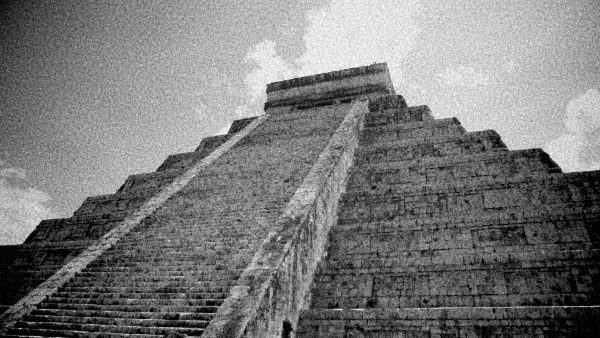Another short story, and as the title might suggest, this one’s a little bit… darker.
12 weeks of writing short stories down. Or three months in the old money. For those just joining me, I’ve challenged myself to write a short story every week for a year. Three months down, nine to go.
I’ve long been a fan of history, and it’s been literally decades since I studied any Aztec history. It’s a fascinating and far more diverse culture than many appreciate, with the added bonus that, had the Aztecs invented Scrabble early enough, many of the names (especially those of the gods) would be worth billions of points.
Still, as far as we know, the Aztecs did not invent Scrabble.
What most people think of when you say “Aztec” is the whole messy human sacrifice part of the culture.
Again, it’s a complex topic, but my own fiction-writing brain just started pondering on how you’d get to that point in a discussion where it seemed reasonable. The very end bit of this story jumped into my head, and I worked from there.
Which leads us to this week’s story. I should point out that most names were chosen semi-randomly (with the exception of Huitzilopochtli) and probably do represent a horrible mishmash of mesoamerican cultures and time periods. This ain’t meant to be a history lesson, but apologies regardless if I really did make a bad hash of it.
Sacrifice

“It has been three cycles of the moon, Icnoyotl. Three cycles!”
“I know this, Huitzilin. Why do you tell me things of which I already know?”
“Three cycles, Icnoyotl, and yet the rain does not fall from the sky.”
“The rain will come. The gods will not forget us.”
“Look out there, my friend. Look out, beyond the temple and the marketplace to the valley below.
It should be green and glowing, the crops ready for the harvesting and the people content.
Instead, what do you see? I will save you coming to the window, save your tired old legs the journey.
All there is is dust. Dust, and the withered vines on which nothing has grown.
Beyond even there lie the arid fields. Fields where many moons ago the farmers laid down both seed and offerings to the gods. Offerings that were in vain.”
“Hush your idle tongue, Huitzilin! You are in the temple of the gods, and they will not take kindly to your blasphemy. You know this!”
“I know… that the people are struggling, and that many have left to join the Olmecs or the Zapotecs, especially amongst the young.”
“You and I were young once, Huitzilin. You remember those days, and the idle imagination of the not yet developed mind. Remember when we sacrificed all those frogs in the hope that it would give us leaping powers?”
“This is different”
“It is not. They will wander, as young people have always done, and when they see the false idolatry of the Olmecs and the cruelty of the Zapotecs, they will come scurrying back.”
“I am not so sure, my friend. Without the rain, the crops will not grow. Without the crops we have nothing to trade and nothing to eat. Those who have not left, those who stay true to the faith grow hungry and weary.”
“The people will always complain in the hotter months. It was always this way, since the gods led us to this valley.”
“The people are starving, Icnoyotl! This is no mere summer dalliance. Out there, in the streets around the temple, people fall and they do not get up.”
“People live, and people die. The tree grows, it blossoms, spreads its seed and then dries out and dies. All this and more, as you know, is in the hands of the gods.”
“That’s just my point, Icnoyotl! The gods provide for us, as they always did. Did… but do no more, it seems. Those who toil in the fields or sell in the markets are growing angry with the gods.”
“What of it? What can an oil merchant or a field tiller do to the gods? They can do nothing, because to the gods, such foolish folk are less than ants are to us.”
“That is so, but many ants can rise up and destroy a man. The temple workers, the officials, you and I… we are but men. And if we fall, what then of the worship of the gods? Would you have us go the way of ancient Tulum, descending into blasphemy, madness and blood?”
“Calm your nerves, my friend. It will not come to that.”
“I do not share your hope and trust in the people, Icnoyotl. The city groans in its discotent, and violence is rife. I have heard it said that it is not safe even for the temple workers to go out after dark.”
“When was that ever a good idea? The cuthroats don’t care whose blood they spill, just that the purse they grab is worth the effort.”
“Nahuatl was attacked in broad daylight the other day, beaten and his grain taken from him.”
“No!”
“Yes, it is so.”
“Did he survive? Does he know who attacked him?”
“He rests in the dormitory. They say the vagabonds hit him from behind, tore at his robes and then fled through the marketplace, their faces covered in cloth.”
“That is… not good.”
“Indeed. So what shall we do?”
“Have the rites been observed properly?”
“They have. You know this! The observances and gifting at the temple continues, though the tithes grow smaller as the people grow more hungry.”
“Well then…There is always… the other way.”
“The other way?”
“It is spoken of in the ancient stories, though seldom was it used. In the darkest times, when the ones on high were busy battling with each other, there was a rite our ancestors used.”
“A rite?”
“A sacrifice. But not of grain, not a giving of oil or a burning of the reeds and pigments. A giving of life, sacrificing one so that many may live.”
“Sacrificing?”
“Yes. It was said to be the highest of honours to be led up the temple steps, sliced open with the sacrificial knife, and to have your heart’s own blood burned for both the people and the gods.”
“That… is barbaric. I’ve heard that the Olmecs delight in such rituals for no purpose other than the letting of the blood. You cannot be serious!”
“Oh, but I am, old friend.
You said it yourself. Three cycles of the moon have passed, and yet we hear nothing from the gods. No sign of favour, no fire from the mountain, no rain for the crops.
The gods are not satisfied with our offerings of grain and pressed oils. We must do more.”
“Do the stories tell of how the person is chosen?”
“The way it was told to me, it was often because it came to the person as a message from the gods while they slept. But if none were chosen in that way, there was a drawing of the reeds.”
“A drawing of the reeds? Like the game that children play while their mothers prepare the meal?”
“The very same. Save for that instead of dedicating the reeds to the pursuit of play, you dedicate them to the gods by soaking them in the temple spices. The gods then choose the man, and the man chooses the shortest reed.”
“Why do I now only hear of this?”
“Who between us sits in the senior seats of the temple? This is not knowledge that is freely shared, because it brings with it the highest of powers.
Such power is not to be trifled with, because the gods prize nothing more highly than the heart blood.
Every one of our warriors is aware that if they fall in battle, where their heart blood is spilled is where the gods will find them in the after life.
Thus is it so for the man chosen as a sacrifice at the temple. If the usual rituals draw no rain and the skies remain dusty, it is a sign. A sign, I say, that we should prepare the reeds, prepare the people and hold a drawing tomorrow before Huitzilopochtli reaches the middle of the sky. It is said that this is when he most favours the heart blood sacrifice.”
“Very… very well, Icnoyotl. I am not happy, but I know I must not question the wisdom of the gods. I will see that it is done.”
Enjoyed this story? It’s week 12 of my challenge, and that means there’s already 11 others to choose from. Maybe more if you’re reading this even later down the track (you could check the short story challenge tag to be sure), but at the time of writing, 11 is your lot.
Short Story Challenge Week 1: Before The War
Short Story Challenge Week 2: Apples Cannot Scream
Short Story Challenge Week 3: Blankets
Short Story Challenge Week 4: Charles Leadworth
Short Story Challenge Week 5: Cloud Running
Short Story Challenge Week 6: The Bowl
Short Story Challenge Week 7: Mr Breckinridge
Short Story Challenge Week 8: Inspiration
Short Story Challenge Week 9: FreeDog
Short Story Challenge Week 10: Black Dog
Short Story Challenge Week 11: I Don’t Know What To Do
The last time I did this, I ended up with enough short stories to fill an eBook. An eBook called Fifty Two, to be precise:

Buy Fifty Two through Amazon for your Kindle e-reader here.
Buy Fifty Two through Apple for your iPad or iOS devices/Macs here.
Buy Fifty Two through Smashwords for any other e-reader format here.
And if you want something entirely different, there’s also my B-movie novel, Sharksplosion.  Yeah, it’s pretty much exactly what you’d think a book with that title might be like:
Yeah, it’s pretty much exactly what you’d think a book with that title might be like:
Buy Sharksplosion for Amazon Kindle
Buy Sharksplosion for iBooks (iPhone, iPad, etc)
Buy Sharksplosion for all other e-readers through Smashwords